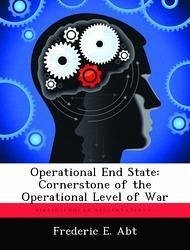This monograph examines the criticality of the operational end state to the conduct of operational warfare through a theoretical and historical analysis from which conclusions concerning current doctrinal treatment of the operational end state are drawn. The theoretical basis for the operational end state begins with the development of linkage between tactical military action and political strategic goals found in the theoretical writings of Clausewitz and Jomini. Their treatment of this subject is reaffirmed by twentieth century military writers such as Lasswell, Huntington, and Brodie. An historical analysis of U.S. military actions since the end of WWII is then presented to determine the validity of theory concerning the criticality of the operational end state to the successful achievement of national strategic goals. Several military actions have been chosen as representative of the application of military force to achieve U.S. strategic goals: the Korean Conflict, the 1961 Cuban "Bay of Pigs", the 1965 Dominican Republic Intervention, and the Vietnam War. This monograph finds that historical actions validate theoretical concepts concerning the criticality of the operational end state in the proper conduct of operational warfare. This criticality is reflected in developing U.S. operational doctrine through an emphasis upon end state development as the first step in constructing a framework for the successful conduct of operational warfare.
Hinweis: Dieser Artikel kann nur an eine deutsche Lieferadresse ausgeliefert werden.
Hinweis: Dieser Artikel kann nur an eine deutsche Lieferadresse ausgeliefert werden.








